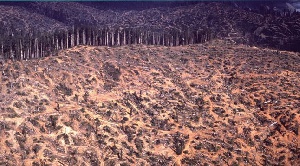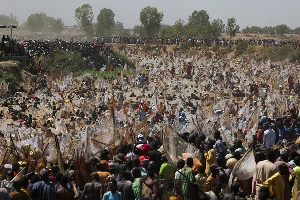Imagine the feeling and reaction when hot water of about 85 Degrees Celsius spills on your hand, the sensation is similar to what happens to organisms, or probably more, when a flame is lit into the dry savannah vegetation.
An onlooker would feel the pain as he or she stands helplessly to see birds and grasshoppers chirping loudly, while crawling mammals like rats and grass-cutters squeak and take cover to avoid being ravaged by the wildfire.
Sadly, the uncontrolled bush fire consumes organisms in the soil including centipedes, millipedes, earthworms, nematodes, mycorrhizal fungi and bacteria, which are microbial organisms and bacteria that have a crucial role to play in making soil fertility happen. Their destruction, therefore, has a negative impact on soil fertility and productivity.
The quality of air is also not spared as the oxygen is polluted with the smoke and sparks from the wildfire, amidst other toxins, which humans have no option but to inhale. Visibility, when driving on the highway, is also reduced as carbon dioxide is emitted.
This typically describes the situation where soil biodiversity is subjected to every dry season, which spans October to April in the three regions of the north and some parts of the Brong Ahafo Region of Ghana. The recently developed National Biodiversity Strategy and Action Plan identified wildfire as one of the threats to biodiversity in the country.
Desertification in the savannah ecological area has been hastened due to wildfires, which have permanently destroyed delicate and vital organic soil material.
Professor Alfred Oteng-Yeboah, the Chair of Ghana National Biodiversity Committee, in an interview with the Ghana News Agency (GNA), said the effects of wildfire are devastating and many people do not know the damage wildfires have on soil warming and fertility.
“We have lost and we continue to lose significant biodiversity as a country through fire … even in the savannah where some species of trees are fire resistant, they get burnt if the fire intensity is high,” he noted.
As the world today marks the 25th Anniversary of the entry into force of the Convention on Biological Diversity and to highlight progress made in the achievement of its objectives at the national and global levels, I turn back to the savannah and observe that not much progress has not been made in stopping the ritual of bush burning.
Ghana’s Commitments to Biodiversity Conservation
This year’s theme: "Celebrating 25 Years of Action for Biodiversity," reminds Ghana that she is under obligation to ensure the sustainable use of the country's biological resources including its soil biodiversity after signing and ratifying the United Nations Convention on Biological Diversity (UNCBD) in June 1992.
Aside the UN Biodiversity commitment, the country has agreed to adhere to the Goal 15 of the 2030 Agenda for Sustainable Development devoted to “protecting, restoring and promoting sustainable use of terrestrial ecosystems, sustainably manage forests, combat desertification, halt and reverse land degradation and halt biodiversity loss”.
Some Causes of Bush Burning and Some Interventions for Restoration
It appears that little premium is put on conservation, use of biodiversity and its existent values. This is why some adolescents continue to resort to the uncontrolled bush burning as one of their main tools, every lean season, to hunt for animals.
Is it also because we do not appreciate the freebees nature gives us, hence headers will set fire on the already dry savannah grass to stimulate the growth of young shoots to feed their animals.
Are we aware that the wanton destruction of soil biodiversity is leading to extinction of some species of plants, animals, fungi and microbial organisms? Not only extinction but also this phenomenon is taking a toll on the agriculture sector in the savannah regions as the soil fertility continues to reduce.
Successive governments and development partners continue to come up with interventions to boost crop production, ensure food security and sufficiency as well as reduce poverty in the savannah regions. Have we for a moment asked why the needed results are not being realised?
According to the United States Agency for International Development (USAID), agricultural growth is the major driver of poverty reduction, especially in northern Ghana, an area characterised by high poverty and malnutrition.
And let us be reminded that nutrition is particularly poor in northern Ghana, where almost two in every five children are stunted and more than 80 per cent of children suffer from anaemia, according to the United Nations Children’s Fund (UNICEF).
Local non-governmental organisations are also complaining bitterly about the indiscriminate bush burning being the biggest challenge to interventions such as the Farmer Managed Natural Re-generation, a restoration initiative.
Burning and Declining Soil Fertility
Mr Ignatius Tindjina, an agriculture development worker, remarked that the constant seasonal burning of vegetation wipes all the microbial organisms including earthworms along with fungi and bacteria that have crucial roles to play in making soil fertility happen.
“These microbial organisms increase nutrients availability to plant by incorporating organic materials into the soil and unlocking the nutrients held within dead organisms and plant litter.”
Prof. Oteng-Yeboah, who is the 2014 MIDORI Prize Winner of Biodiversity, further explained that; “Nutrients like Phosphorus and Nitrogen become more readily available to plants after digestion by earthworm and excreted in earthworm casts. The earthworm movements open spaces or pores within the soil that facilitate the flow of air, water and soluble nutrients down to the roots of plants”.
Mr Tindjina, who has lived and worked in the Savannah region for more than 30 years, recalled that it was rare, for instance, to spot earthworm on the field in recent times, and expressed fear that urgent steps needed to be taken to stop the seasonal fires.
“Years back there were many different types of worms but…this is a worrying situation because thriving earthworm population is an indication of a healthy soil. This observation tells us that our soils’ nutrients have reduced drastically and farmers who crop without chemical fertilizers get low yield,” he added.
Similarly, scientists such as Skubala, (2013) say that the contribution of soil fauna such as earthworm play an important role in soil processes and affect ecosystem services essential for human well-being.
Sampling options of smallholder farmers from the three Savannah regions show that their narratives are not different as they point to the fact that yields continue to decline over the years.
For instance, 50-year-old Alhaji Tanko Iddrisu, a farmer in Walewale, recalled that in his youthful days when he was introduced to farming they did not need to apply chemical fertilizer, yet they had a bumper harvest.
“Farming has become very expensive now. Without applying fertilizer to the crops, I will not even get four bags of maize from my three-acre farm to feed my family.”
Prof. Oteng-Yeboah said: “Burning vegetation or using it as an agricultural tool means getting rid of the nutrient that plants will need…it is better not to burn so you can sustain your livelihood with natural fertility”.
Urgent Solutions
While in recent years, Ghana continues to lose an ever-increasing percentage of its Gross Domestic Product (GDP) to the indiscriminate ravages of wildfires, the country is yet to develop a Communications Strategy to address such issues, Professor Kwabena Frimpong-Boateng, the Minister of Environment, Science, Technology and Innovation, said in a recent meet-the-press series.
However, Prof Oteng-Yeboah called for a comprehensive and practical education of chiefs, heads of families, opinion leaders and youth groups on the negative effects of bush burning to the environment and its cost to the country and the world.
“If we don’t stop burning we will burn everything that is available and it will cost the country millions of cedis to reverse the degraded land.
“The cost of rehabilitation is higher than the cost of educating people to protect the vegetation. Burning threatens livelihoods and we have the obligation to protect our diversity,” he cautioned.
Mr Tindjina suggested that regional traditional councils in the Savannah zones must ban burning and impose a harsh punishment to offenders. He added that the situation, if not checked, will be the next environmental problem like the illegal mining menace, popularly called ‘galamsey,’ which has become a daunting task for the Government.
Opinions of Tuesday, 22 May 2018
Columnist: Yaw Ansah















